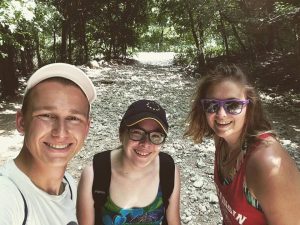When I first decided to pursue nonprofit public relations a year or so back, it was mostly because I didn’t want to work in corporate America. The idea of big business meetings filled with people in suits (which is how I stereotypically envisioned the corporate world) just didn’t appeal to me. So when people asked me what I wanted to do when I graduated, I said nonprofit PR. But now, after having a couple of internships in nonprofit communications, I know that that decision I made on a whim was the right one.
Over the past few semesters, I’ve taken some classes that have ignited an interest in human rights, so much so that I bookmarked the website with the Universal Declaration of Human Rights. Here in the U.S, we take so many of these rights for granted. But there is a plethora of places around the world where people don’t have their fundamental human rights. Obviously, the lack of human rights is a difficult problem with no easy solution. There are political, economic, and social reasons as to why people don’t have all their human rights and nothing is going to fix that overnight. However, there are changes that can be made to aid the process. As I’ve learned during my time at Water to Thrive this summer, water is one of those changes.
Article 25 of the UDHR states, “Everyone has the right to a standard of living adequate for the health and well-being of himself and of his family, including food, clothing, housing and medical care and necessary social services, and the right to security in the event of unemployment, sickness, disability, widowhood, old age or other lack of livelihood in circumstances beyond his control.” No access to clean water = No adequate living. It’s as simple as that. Unclean water sources lead to waterborne diseases, such as diarrhea. I’ve gone through a myriad of statistics to support this claim. 50% of rural Africans suffer from waterborne illness. 10% of children die before their 5th birthday because of diseases such as diarrhea. I’ve seen pictures of women gathering water from the same streams where their livestock are drinking. That’s just not healthy. In the villages where Water to Thrive builds clean water wells, waterborne disease is nearly eradicated.
Article 26 states “Everyone has the right to education. Education shall be free, at least in the elementary and fundamental states. Elementary education shall be compulsory. Technical and professional education shall be made generally available and higher education shall be equally accessible to all on the basis of merit.” Education is one of the biggest areas I’ve focused on at Water to Thrive recently. Children spend hours every day walking to retrieve water, causing them to miss school. The diseases they get from these unclean water sources also keep them from attending classes. Just the other day, I was reading through some testimonials from a school in Uganda where W2T is hoping to build a well. These kids talked about how they have to miss school to gather water and often get diseases like cholera and typhoid from it. Although they have the right to education, many cannot get that education because of something as simple as water.
My time at Water to Thrive has taught me a lot, from marketing skills to navigating Austin public transportation, but what has impacted me the most was learning about the African water crisis and reflecting on the effect it has on human rights. Through writing articles and working on an informational packet to send out to schools, I’ve been able to share the importance of clean and accessible wells. Although I’m not out in the field building wells myself, I still feel that I’m making a difference through spreading awareness. St. Francis of Assisi once said, “Don’t change the world, change worlds.” While Water to Thrive isn’t going to single-handedly end the African water crisis, they are changing the lives of individuals every day. And that’s what service is all about.

